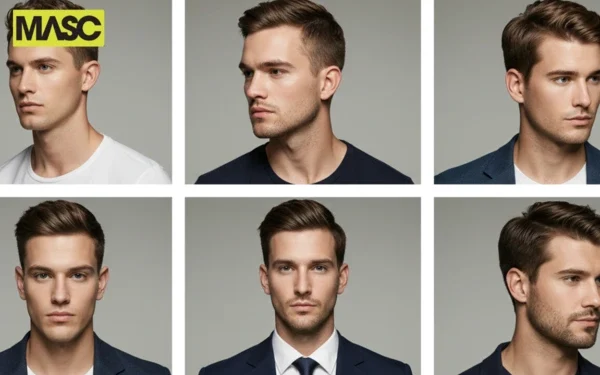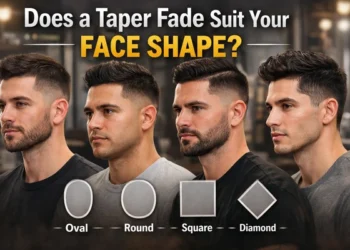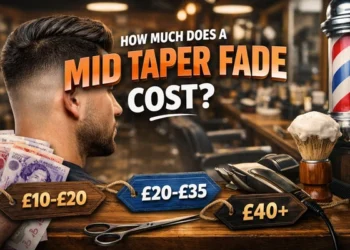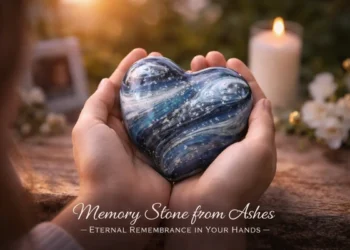You know that feeling when you see a guy with a perfect haircut that just works? Everything looks balanced, sharp, and effortlessly cool. Then you try the same style and it looks… wrong. Here’s why: he chose a cut that works with his face shape, not against it.
Most men pick hairstyles based on trends or what looks good on celebrities. But here’s the truth; the best haircut for you is the one that enhances your natural features and fits your face shape. Get this right, and you’ll look like you’ve had a complete makeover without changing anything else.
The difference between a good haircut and a great one often comes down to understanding your face shape and choosing styles that create the right proportions.
How to Determine Your Face Shape
Before diving into specific styles, you need to know what you’re working with. Stand in front of a mirror and pull your hair back completely. Look at the overall shape of your face from forehead to chin.
Quick identification method:
- Measure the width of your forehead, cheekbones, and jawline
- Note the length from hairline to chin
- Compare these measurements to identify your shape
Don’t overthink it; most faces fall into one of five main categories, and knowing yours makes choosing a haircut much simpler.
Face Shape Breakdown and Best Styles
1. Oval Face: The Versatile Winner
Characteristics: Balanced proportions, forehead slightly wider than jaw, gently curved jawline
Why it works: Oval faces have natural symmetry, making them the most versatile face shape. Almost any hairstyle can work.
Best styles:
- Classic side part: Timeless and professional
- Textured quiff: Modern with personality
- Medium-length waves: Casual but polished
- Buzz cut: Clean and masculine
Styling tip: You can experiment with most trends. Focus on styles that match your lifestyle rather than worrying about face shape restrictions.
2. Square Face: Soften Those Angles
Characteristics: Strong jawline, broad forehead, angular features, equal width and length
Why it matters: Square faces have bold, masculine features. The goal is to soften hard angles while maintaining that strong look.
Best styles:
- Layered cuts: Add texture and movement
- Side-swept fringe: Breaks up the forehead line
- Longer on top, shorter sides: Creates vertical lines
- Textured crop: Modern and easy to maintain
Avoid: Buzz cuts or styles that emphasize the square shape, like flat-tops or sharp, geometric cuts.
3. Round Face: Add Height and Definition
Characteristics: Full cheeks, rounded chin, width and length roughly equal, soft features
Why it matters: Round faces can look youthful, which is great, but you might want more definition and structure.
Best styles:
- Pompadour: Adds significant height
- Undercut with volume on top: Creates contrast
- Angular fringe: Adds sharp lines
- Faux hawk: Elongates the face
Avoid: Bowl cuts, rounded styles, or anything that adds width to the sides.
4. Heart Face: Balance That Strong Forehead
Characteristics: Wide forehead, narrow chin, prominent cheekbones
Why it matters: Heart-shaped faces need styles that add weight to the lower portion while minimizing forehead width.
Best styles:
- Side-swept bangs: Covers part of the forehead
- Longer styles: Add volume around the jawline
- Textured crops: Keep bulk lower on the head
- Chin-length cuts: If you’re growing it out
Avoid: Short, spiky styles that emphasize the forehead width.
5. Diamond Face: Highlight Those Cheekbones
Characteristics: Narrow forehead and chin, wide cheekbones, angular features
Why it matters: Diamond faces have striking cheekbones that should be highlighted, not hidden.
Best styles:
- Side-parted cuts: Add width to the forehead
- Textured fringe: Balances narrow forehead
- Layered styles: Create movement and interest
- Chin-length styles: If going longer
Avoid: Styles that add too much height or width at the cheekbones.
Complete Style Guide by Face Shape
| Face Shape | Best Styles | Styling Products | Avoid |
| Oval | Most styles work | Varies by style choice | Overly experimental cuts |
| Square | Layered cuts, side sweeps | Light pomades, texturizing paste | Buzz cuts, geometric styles |
| Round | Pompadours, undercuts | Strong-hold pomades, volumizing products | Bowl cuts, rounded styles |
| Heart | Side bangs, longer styles | Medium-hold styling cream | Short, spiky tops |
| Diamond | Side parts, textured cuts | Flexible-hold products | Extreme height, wide styles |
Hair Texture and Thickness Considerations
Your face shape is just one piece of the puzzle. Hair texture and thickness dramatically affect how styles look and behave.
1. Fine Hair
- Challenges: Lacks volume, can look flat
- Best approach: Shorter styles with layers, texturizing products
- Styling: Use volumizing products, avoid heavy oils
2. Thick Hair
- Challenges: Can look bulky, difficult to control
- Best approach: Taper cuts, strategic thinning
- Styling: Strong-hold products, regular maintenance
3. Curly Hair
- Challenges: Natural texture needs to be worked with, not against
- Best approach: Embrace the texture, find length that works
- Styling: Curl-enhancing products, minimal brushing
4. Straight Hair
- Challenges: Can look flat without styling
- Best approach: Most versatile, works with many cuts
- Styling: Quality hair pomade for men provides hold and shine
Lifestyle and Maintenance Factors
The best haircut is one you can actually maintain. Consider these practical factors:
High-Maintenance Styles
- Undercuts: Need trimming every 2-3 weeks
- Pompadours: Require daily styling
- Precise fades: Show growth quickly
Low-Maintenance Styles
- Textured crops: Grow out naturally
- Longer layered cuts: Less frequent trims needed
- Natural textures: Work with your hair’s natural pattern
Professional Requirements
Some workplaces have grooming standards. Classic styles like side parts, conservative lengths, and well-groomed cuts are generally safe choices.
Common Styling Mistakes to Avoid
- Copying celebrities blindly: What works on someone else might not work on you
- Ignoring your barber’s advice: They see your hair objectively
- Fighting your natural hair type: Work with your texture, not against it
- Skipping regular maintenance: Even low-maintenance cuts need upkeep
- Using the wrong products: Quality styling products make a huge difference
Professional vs. DIY Styling
When to See a Professional
- Major style changes
- Complex cuts like fades or intricate layering
- Color work
- When you’re unsure about what works
What You Can Maintain at Home
- Basic trimming between cuts
- Daily styling and product application
- Simple touch-ups
Invest in quality tools and products from specialized retailers like ShopMASC that understand men’s grooming needs. Professional-grade products perform better and last longer than drugstore alternatives.
Making Your Choice
The perfect haircut combines your face shape, hair type, lifestyle, and personal style preferences. Don’t rush the decision; a good cut should make you feel confident and look like the best version of yourself.
Start with styles recommended for your face shape, then consider your hair texture and maintenance preferences. A skilled barber can help refine your choice and suggest modifications that work specifically for you.
Remember, hair grows. If you’re unsure, start with a more conservative length and adjust from there. It’s easier to cut more hair than to wait for it to grow back.
Your haircut is one of the first things people notice about you. Make it count by choosing a style that enhances your natural features and fits your lifestyle.
Frequently Asked Questions
1. How often should I get my haircut to maintain my style?
Most men’s hairstyles need maintenance every 3-4 weeks, though this varies by style. Fades and undercuts need more frequent touch-ups (2-3 weeks), while longer, layered cuts can go 4-6 weeks between appointments.
2. Can I change my face shape with the right haircut?
While you can’t actually change your bone structure, the right haircut can create optical illusions that balance your features and enhance your best attributes. Strategic styling can make faces appear longer, wider, or more defined.
3. What if I have a combination of face shapes?
Many people have features from multiple categories. Focus on your most prominent characteristics and choose styles that address your main concerns. A skilled barber can help identify which elements to emphasize or minimize.









